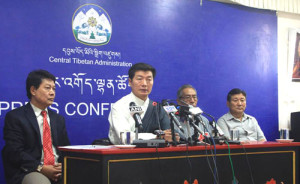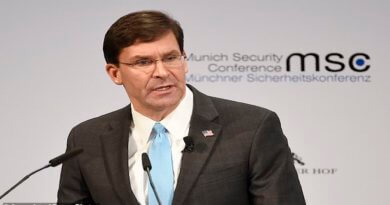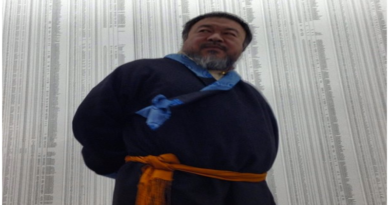CTA issues response to China’s white paper on Tibet, says Tibet was an independent country historically
DHARAMSALA, Sep 1: The Central Tibetan Administration today released a book titled “Tibet was not part of China but middle way remains a viable solution: Central Tibetan Administration’s response to China’s white paper on Tibet” at a press conference held here in Dharamsala and also responded to the recent statements made by Chinese leaders at the 6th Tibet Work Forum held in Beijing over Aug 24-25.
The elected political head of the Tibetan people Sikyong Dr Lobsang Sangay presided over the press conference in the presence of Tashi Phuntsok and Sonam Norbu Dagpo, Secretaries for the Department of Information and International Relations, CTA and Thupten Samphel, Director of Tibet Policy Institute which functions as a think tank for the CTA.
The event coincides with Beijing’s commemoration of the 50th anniversary of the founding of the Tibet Autonomous Region in Lhasa beginning today Sep 1, 2015. The anniversary celebration was preceded by the 6th Tibet Work Forum which was presided over by President Xi Jinping and attended by the top Chinese leadership in the party, military and government.
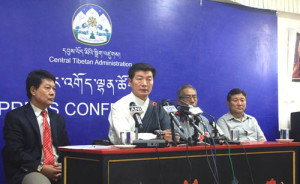 At the meeting, President Xi Jinping said, “Key efforts in the work for Tibet should be spent on ensuring national unity and consolidating ethnic unity, with realising long-term and comprehensive social stability as an obligatory task.” Xi Jinping said the country should “firmly take the initiative” in the fight against separatism.
At the meeting, President Xi Jinping said, “Key efforts in the work for Tibet should be spent on ensuring national unity and consolidating ethnic unity, with realising long-term and comprehensive social stability as an obligatory task.” Xi Jinping said the country should “firmly take the initiative” in the fight against separatism.
“The ground work for all this was prepared by China’s white paper on Tibet, issued on 15 April. The white paper reiterated China’s focus in Tibet on the twin efforts of economic development and political repression. The key message of the white paper said that there would be no change in this policy,” read a press statement issued by the CTA.
Giving an overview of the 31-page book published by the Department of Information and International Relations, Sikyong Sangay spoke on CTA’s response to the four major issues covered in China’s white paper and the recent statements made by Chinese leaders at the 6th Tibet Work Forum.
“Beginning today, Chinese government is observing the 50th anniversary of the founding of the Tibet Autonomous Region. And I’m sure, in a few days time, Chinese leaders will visit the capital city of Tibet, Lhasa and make some announcements, pronouncements and statements. But we assume that whatever they say will not be different from the recent statements made after the 6th Tibet Work Forum where Chinese leaders Xi Jinping and Prime Minister Li Keqiang and Yo Zhengsheng, the chairman of the political consultative conference met. The statement that came out from the Tibet Work Forum is very similar to the white paper issued by the Chinese government several months ago. If you go through the white paper, they have made four points: 1) Historically, Tibet was always part of China, 2) As for the reincarnation of the Dalai Lama, the Chinese government has the sole authority, 3) The middle way approach is not acceptable, 4) Economic development and progress that the Chinese government has made in Tibet has benefited Tibetans.
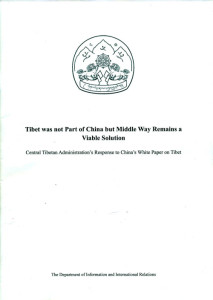 Our response to these claims are as follows: 1) Tibet was not an integral part of China because Tibet was an independent country historically and historians don’t dispute that; Tibet is under occupation today, 2) As far as the reincarnation of the 14th Dalai Lama is concerned, it is the sole prerogative of His Holiness the Dalai Lama and no one else, 3) Middle way approach is still a mutually beneficial policy which benefits the Chinese government and China as a country. Because if you find a peaceful solution to the Tibet issue, China’s soft power will increase because international community has increasing skepticism and anxiousness towards Chinese government. It will also be a catalyst for building trust with neighbours, including India and obviously, it will bring credibility to the Chinese government in the eyes of people in Hong Kong, Taiwan, Mongolia and the Uighur people. These are the reasons why MWA is beneficial to the Chinese government and the Tibetan people if genuine autonomy is granted to the Tibetan people. 4) As far as economic development that they have claimed benefits the Tibetans, it primarily benefits the Chinese,” he said.
Our response to these claims are as follows: 1) Tibet was not an integral part of China because Tibet was an independent country historically and historians don’t dispute that; Tibet is under occupation today, 2) As far as the reincarnation of the 14th Dalai Lama is concerned, it is the sole prerogative of His Holiness the Dalai Lama and no one else, 3) Middle way approach is still a mutually beneficial policy which benefits the Chinese government and China as a country. Because if you find a peaceful solution to the Tibet issue, China’s soft power will increase because international community has increasing skepticism and anxiousness towards Chinese government. It will also be a catalyst for building trust with neighbours, including India and obviously, it will bring credibility to the Chinese government in the eyes of people in Hong Kong, Taiwan, Mongolia and the Uighur people. These are the reasons why MWA is beneficial to the Chinese government and the Tibetan people if genuine autonomy is granted to the Tibetan people. 4) As far as economic development that they have claimed benefits the Tibetans, it primarily benefits the Chinese,” he said.
Explaining further on the development claims made by the Chinese leaders, Sikyong Sangay said, “Most of the work forums are about economic packages. Recently they have been using a term called Dhete Dhelen, give happiness and get stability. So what they claim is that they are giving happiness through economic packages to the Tibetan people and they should get stability and internal security in return. But these packages have not benefited the Tibetan people but the Chinese people. For example, Chinese government has recently announced that they will upgrade Nyingtri, Shigatse and Chamdo to city level. So, from the jargon of the development point of view, when you say, when you upgrade a town to a city level, it sounds progress; it sounds development. But in actuality, what happens is that, in town, they are certain protection for the local people but when you upgrade it to a city, anyone can come in and then rules and regulations for the movement of the people and for businesses loosen up; it becomes more flexible. So, that opens the door for Chinese migrants to come to Tibet and run businesses, own shops and restaurants. We know it from the experiences we have had, at least what we’ve witnessed in Lhasa when it was upgraded to a city. Now the majority of the population in Lhasa is Chinese, almost 70-80% of businesses are owned or run by Chinese. Even taxi driver’s licenses are given to Chinese and then it is outsourced to Tibetans and the ownership of the taxis also lie with the Chinese. So these developments and upgradation to city level primarily benefit the Chinese migrants and not the Tibetans.”
Sikyong Sangay concluded by saying that the Tibetan people’s contentment lies in the return of His Holiness to Tibet and freedom for Tibetans.
“Tibetans in Tibet are not content and Tibetans are still resentful. The 142 Tibetan self-immolators have said it loud and clear that Tibetans are not content. Tibetans want to see the return of the Dalai Lama to Tibet and freedom for the Tibetan people. So beginning today they will celebrate in Lhasa but the celebration will be forced celebration, the smiles that the Tibetans might be showing will be a taxed smile, a forced smile,” Sikyong Sangay emphasised.
Answering questions from reporters, Sikyong Sangay said it seems Chinese leaders are considering Tibet as an important issue.
“Considering the fact that they have held the Tibet Work Forum in five years and that too, after Xi Jinping became President and the kind of fundamental changes they have made to how the United Front Work Department functions, it seems they are considering Tibet as an important issue. Such meetings are not held so often for Mongolia and Xinjiang but we can’t say for sure what is on the minds of the key Chinese leaders. So it is important to get an in-depth knowledge on what they discussed during the Tibet Work Forum,” he said.
Asked about Sino-Tibet talks which has been stalled since 2010 and on what basis the talks will be held as Chinese leaders have strongly rejected the Middle Way Approach, which was the basis of the talks when negotiations were held until it was stalled, Sikyong said: “If you look at world history, for example the issues of India, Northen Ireland, East Timor, South Africa which have been solved…if you look at the debates and discussions held even a day before these issues were resolved, opposing parties have always maintained that they are right and the other party is wrong. They have always maintained that they do not accept the other party’s version because the day they accept it, then they have to agree to it. So the Chinese government’s recent statements on MWA are expected. If they agree to the MWA, then they will have to find a solution to the issue. So that’s how politics work. Therefore, the Chinese government is making these statements stressing their political stand and we will stick with MWA which has support from the White House and the European Union. Recently the President and the Foreign Secretary of the EU has urged the Chinese government to talk with the Tibetan representatives. We are still trying to establish Sino-Tibet talks; there is no let down on this front. Earlier the talks were held between the representatives of the Dalai Lama and the Chinese government. In future too, the CTA maintains that the talks will be held between the representatives of the Dalai Lama and the representatives of the Chinese government. Both His Holiness and the current Kashag are concerned about the talks and we are working hard to establish the talks.”

